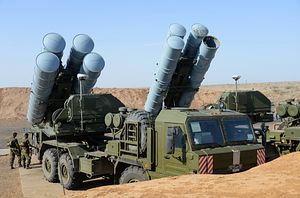India will not receive a blanket sanction waiver should it proceed with purchasing the Russian-made Almaz-Antei S-400 Triumf air defense systems (NATO reporting name: SA-21 Growler) for service in the Indian Air Force (IAF), a senior U.S. State Department official reiterated in a briefing with reporters on January 8.
The official noted that reports suggesting that India will receive a blanket waiver are wrong. “There is not a blanket waiver,” the official stressed. “Congress certainly never designed that or anticipated that, nor did the administration.” The official did note, however, that “while there’s not a blanket waiver, there’s also not a blanket application.”
Instead, there will be a case-by-case analysis on where sanctions, mandated under U.S. legislation known as the Countering America’s Adversaries Through Sanctions Act (CAATSA), could be applied, the official added.
CAATSA decrees sanctions on nations engaging in “significant transactions” — defined as any purchase above $15 million — with the Russian state-owned defense industry. The U.S. president, however, retains the authority and right to issue a waiver.
“Indian officials know that there’s a risk of application of sanctions,” the official said. “Indian officials also know that we want to work with them to find a path forward where they have historic sustainment lines that certainly don’t put them at CAATSA risk. The challenge we have with any state like India is new acquisitions on significant systems that would either put at risk our platforms or expose our technologies to an adversary.”
The United States has expressed particular concern over countries operating U.S. advanced fighter jets like the F-35 in conjunction with Russian air defense systems such as the S-400. The fear is that it would provide Russia (and China) with sensitive information about U.S. stealth technology.
“What we don’t want India to do is to introduce something that as we continue to go forward in this partnership makes it challenging or exposes risk to our technology on future acquisitions,” the official noted. At the same time, he emphasized that the United States wants “to work” with India to assure it does not fall afoul of sanctions under CAATSA.
India and Russia signed a $5.5 billion contract for five S-400 squadrons in 2018 during a bilateral summit between the two countries. India made a $800 million advance payment in November 2019. Deliveries of the first systems are expected to begin in October of this year and will be completed by 2025, according to according to the head of Russian defense industrial group Rostec, Sergey Chemezov.































